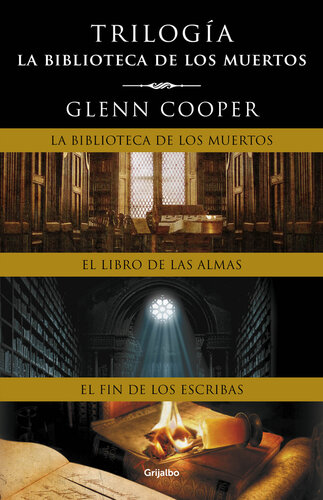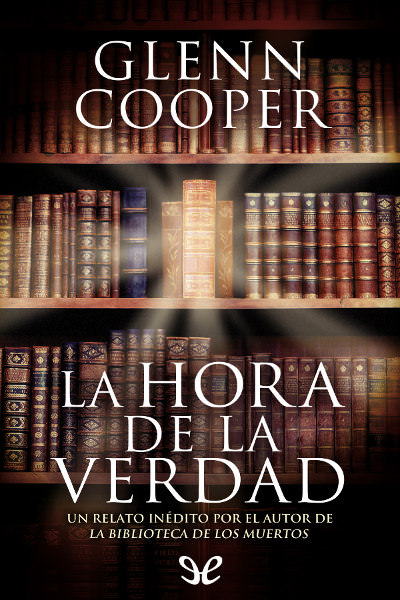oleebook.com
La clau del destí de Glenn Cooper
de Glenn Cooper - Género: Histórico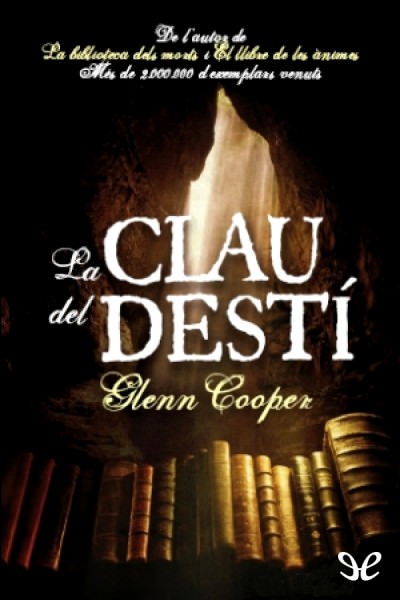
Sinopsis
Monestir de Ruac, 1307. A les portes de la mort, labat i últim monjo de la germandat vol deixar constància del seu llegat per escrit: el secret que explica la seva enorme longevitat i que ha amagat amb zel durant més de dos-cents anys. En unes misterioses coves on sembla que només hi hagi roca calcària i humida foscor, es troba la fórmula de leterna joventut. Un aparent miracle que no obstant això, pot esdevenir una maledicció
França, a lactualitat. Entre les ruïnes del monestir de Ruac, un equip darqueòlegs acaba de trobar un manuscrit antic i deteriorat, que els posa sobre la pista duna gruta oculta. Però algú està disposat a obstaculitzar la investigació
i fins i tot a matar per protegir el seu secret
El secret de leterna joventut, el desig més preuat per lhome, podria estar a punt de ser revelat. Però, estem preparats per enfrontar-nos al nostre destí?
Descargar
Descargar La clau del destí ePub GratisLibros Recomendados - Relacionados
Reseñas Varias sobre este libro
Leído en 2013.
Absolutamente nada que reprocharle a esta novela creada por y para el consumo de masas.
Tiene todos los ingredientes para crear una novela de éxito (parece casi de manual) y, lo más importante, el autor los adereza con un estilo lo suficientemente correcto para crear una novela atrayente, que atrapa más o menos y que en general te lees con ganas y buen humor.
Ingredientes :
- Cójase chico guapo/atractivo.
- Cójase chica guapa/atractiva.
- Procure que haya rollito entre ellos.
- Cójase trama que se desarrolla en varias épocas históricas y que sean confluyentes (se puede aderezar con templarios-conspiraciones-seres mitológicos o semi inmortales. Al gusto)
- Añádanse asesinatos, a ser posible de autor/autores inicialmente desconocidos (se admiten truculencias o alguna violación, que llama más).
- Que haya un poco de misterio, un poco de amor, un poco de sexo y que acabe bien.
- Mézclese todo ello con un poco de saber hacer y ... ¡voila!, tiene usted su novela de gran consumo.
Decir que me ha gustado, me ha enganchado y me lo he pasado bien leyéndola. Lo digo por si parece que lo que he dicho antes parece un poco frio para con la novela. Es un best seller. Ni más, ni menos. Pero ya le gustaría al autor que comienza en ese arduo mundo conseguir crear una novela como esta, que se consume con placer y deja halagos (al menos el mío) por el camino.
P.D: El título, La llave del destino es lo que menos me encaja de la novela. ¿Qué coño llave de qué destino?¿Acaso por vivir más hay una llave?¿Es el té rojo esa supuesta llave?.11 s Julie868 78
I think I got a bit obsessed with Glenn Cooper this fortnight, after reading his first two earlier books about the Vectis Library.
So in The Tenth Chamber, we are taken to remote caves in rural France where a great new discovery is made of early cave paintings. As a team descend to uncover its secrets the somone is not happy about them being made public.
The beginning was interesting and I enjoyed learning a little about the Lascax paintings Auriganacian period, 32,000 years ago. Somewhere in the middle though I could sense where it was heading, and watched it descend into Dan Brown silliness. Still it is harmless fun, and better than the TV.11 s LettriceAssorta370 138
Glenn Cooper lho scoperto un po di anni fa per caso. Stavo cercando come al solito un libro da leggere quando dallo scaffale della libreria vedo occhieggiare un titolo interessante: La Biblioteca dei Morti. Lho subito acquistato ed è stato amore fin dalla prima pagina: la storia mi ha preso a tal punto che ho divorato il libro e mi sono procurata gli altri della trilogia. Inutile dire che di questo autore ho letto tanto e ci tengo a precisare che alcuni libri mi sono piaciuti maggiormente, come per esempio quelli relativi al ciclo dei Dannati, altri meno, come il Segno della Croce. Questa settimana mi sono dedicata con curiosità e grande aspettativa, ad un romanzo di Cooper che ancora non avevo avuto loccasione di leggere: La Mappa del Destino. Qui di seguito vi lascio le mie impressioni.
La storia, cattura fin da subito e segue una formula ben oliata che si sviluppa attraverso il prologo, un consueto espediente volto ad attrarre il lettore nelle spire narrative e avvilupparlo in una rete sapientemente ordita per stupire e creare tensione. In questo caso però, un particolare non mi ha convinta. Prima di svelarvi quale, voglio specificare che si tratta di una mia considerazione e come tale potrebbe non trovare tutti daccordo, ma così è e, come diceva qualcuno, io in quanto soggetto, sono soggettivo, se fossi un oggetto sarei oggettivo. A parte gli scherzi, nel prologo si parla di una stupefacente scoperta archeologica assolutamente casuale, ad opera di uninsegnante e di suo cugino. I due decidono successivamente di recarsi in un bar per prendere qualcosa da bere e da mangiare e in quel contesto, il cugino spiattella la scoperta ad un gruppo di rozzi bifolchi e al lugubre e poco rassicurante gestore del bar, andando così incontro ad una tragica fine. Sinceramente, ho trovato lincipit improbabile. Linsegnante, per quanto ingenuo, appartiene al mondo accademico e come ben si sa, gli accademici sono piuttosto gelosi delle scoperte che potrebbero farli balzare agli onori e alla gloria. Dunque mi sembra strano che il suddetto insegnante e suo cugino, entrino in un bar trafelati come due sempliciotti e senza un minimo scrupolo, lincauto parente dia fiato alle trombe! Va bé, per una come me reduce dalla lettura di Cercatori di Ossa di Michael Crichton, nel quale si racconta di accademici avventurosi che si scannano vicendevolmente per lattribuzione della scoperta di alcune ossa di dinosauro, è un pochino inverosimile
La storia nel complesso è avvincente, la divisione in capitoli è perfetta e arricchisce il romanzo poiché contribuisce a creare suspence, a suddividere le varie vicende, a cadenzare con il giusto ritmo, a conferire respiro. Anche in questo romanzo Cooper riprende un tema evidentemente a lui caro che è quello della morte. In molti dei suoi romanzi infatti, lautore porta alla luce quelle che sono le paure e le debolezze più ataviche delluomo. Ne Lultimo giorno lautore propone una trama avvincente che ci porta ai confini della vita e ritorno, cosa che viene riproposta in salsa dantesca anche nella trilogia Dannati. Ne La Mappa del Destino invece, si sofferma sul tema dellelisir di lunga vita, un liquido ricco di acido lisergico contenente sostanze non identificate che conducono ad unestrema longevità. Sia ne L Ultimo giorno che ne La Mappa del destino, si racconta di bevande, ottenute a caro prezzo, che donano potere ma hanno anche tremendi effetti collaterali. Insomma, argomenti evergreen che smuovono le acque scure dei nostri timori più reconditi, quali la morte e le malattie e convergono con sapienza in una formula vincente a base di qualche elemento di storia, archeologia, religione e restituendo una trama intensa e coinvolgente. Bellissima la descrizione della scoperta della caverna e delle sue immagini relative allarte rupestre policromatica, simili per fattura e stile a quelle delle grotte Lascaux. Nel libro trovano spazio, anche piccoli momenti di introspezione del personaggio principale, il quale in un momento di particolare sconforto, fa autocritica e si interroga sulla causa del suo atteggiamento frivolo con le donne, forse da ricercare nel rapporto conflittuale con il padre e con un maldestro tentativo di emularlo che sfocia in una drammatica dissonanza cognitiva: Luc rimane come cristallizzato, oppresso dal peso della decisione di aver lasciato Sara ma nello stesso tempo, si sente impantanato nellimpossibilità di tornare indietro.
Una lettura interessante, anche se a mio parere, distante anni luce dai fasti della saga relativa alla Biblioteca dei Morti. La scrittura è come al solito superlativa ma non sufficiente a sopperire alla mancanza di completa originalità del romanzo. Nel complesso, una lettura da non disdegnare. Aspetto con ansia di leggere lultimo lavoro.
Buona lettura www.ilviziodileggereblog.wordpress.com9 s Pili573
Tenía ganas de "reconciliarme" con este autor. Lo descubrí con su trilogía Will Piper - que disfruté enormemente - pero después cometí el error de leer La Piedra de Fuego. Con La Llave del Destino recupera los elementos con los que me conquistó: manuscritos antiguos, el arte de la restauración de libros, monjes escribanos... y con ellos recupera también a una fan.7 s Graham1,319 63
One of those Dan Brown cash-ins you seem to see everywhere around.
This one started off strongly but soon deteriorated. Cooper builds up the mystery surrounding the ancient cave very strongly, then adds in some Ten Little Indians-style murders which ratchet up the tension no end. Unfortunately, about halfway through the book that plot comes to an end, and then the author seems at a loss what to write about.
Annoyingly, he chooses to incorporate two other elements of history relevant to the contemporary story. One involves primitive man, the other some medieval priests. Both of these accounts are dry, dull and written a boring history book. They add absolutely nothing to the story and could have been easily excised.
The modern-day thrills become increasingly unbelievable until Cooper shows his hand with a twist that's been pretty much obvious since the beginning anyway. The ending boils down to simple, well-worn components and a ton of contrivances. As a whole the book is far from impressive. I can't fault the research, but the whole thing seems to have been written on the fly.mystery thriller6 s Luca Masera246 73
Classica lettura estiva da "sotto l'ombrellone" quando il livello di attenzione è quello di Homer Simpson nel paese del cioccolato (https://www.youtube.com/watch?v=mJZo-... trama scialba, personaggi monocromi, colpi di scena scontati al limite del ridicolo e lettura nemmeno tanto fluida (che dovrebbe almeno essere il contraltare per tanta semplicità). Ora, è vero che non tutti i romanzi di questo tipo devono ambire ad essere il nuovo "Q", senza ovviamente nominare "Il nome della rosa", ma qualcosa in più dal primo libro di Glenn Cooper della mia vita in tutta onestà me l'aspettavo. 5 s A.M. DeanAuthor 5 books445
I walked into Glenn Cooper's The Tenth Chamber a bit unknowing, not having read his other works, and I'll admit I was leery. Ancient cave art? Modern-set historical fiction that involves . . . St Bernard of Clairvaux, with Abelard and Heloise?
But something compelled me to pick up the book despite my worries, and I'm profoundly happy I did. It turns out, The Tenth Chamber is one of the most enjoyable reads I've had this summer, commanding my attention for a solid 24 hours as I simply couldn't put it down.
Cooper has artfully woven together a modern plot, a medieval historical thread (that brings some rather famous figures into a storyline that I rather suspect would surprise them!), as well as a second historical track that's far, far older. The story that results is mysterious, compelling, exciting, and a little bit haunting -- all adjectives that are only to be desired in a book of this genre.
There are plenty of deaths and even explosions in The Tenth Chamber, but it isn't a book that relies on its 'action' to keep up its pace. What had me hooked was the sense of mystery, of time and secrecy: these are the things that had me turning the pages with such addictive speed and intensity.
Cooper paints beautiful scenes, weaves together nicely suspenseful chapters, and tells a very good story. Highly, highly recommended and worth each of its five stars.historical-fiction thrillers5 s Jeanne Adamek749 119 Read
Dnf pg 256
This story was going to a place I just didn't want to read about. Although I have the utmost respect for authors (I could never write a book), I honestly felt the direction that the author was taking was a cheat, something that I have read a number of times and have never d, but have seen better executed.
I might have kept on with the story if I had enjoyed the characters. I had no real connection to the characters and for the most part did not what I found out about them. I understand about flaws & actually need characters to have some. But I also need something more.
I do not rate books that I don't finish. Because I have read so much of this I have to say that what I read wouldn't have rated better than 1.5 stars. Oh well... 5 s John568 10
Finished this book, but I am not sure what it was about. Is it a story of the discovery and preservation of prehistoric art in a French cave? Is it a story about French resistance ambushing a German train loaded with stolen WWII currency and artifacts? Is it a story about man's search for eternal life? Actually, it touches on all of these, and the end result is a high body count, a shadowy French intelligence agency, and a lot of questions. 5 s Nerine DormanAuthor 66 books220
While this isn't the most earth-shattering read to land on my desk, Glenn Cooper nonetheless delivers an entertaining novel. Mixing historical periods (with a less raunchy nod to Jean M Auel's Earth's Children) Cooper presents us with Luc Simard, a dashing cad of an archaeologist. When a mysterious illuminated manuscript is discovered, Simard is discovers a cave that rivals the splendors of Lascaux. While the story is well told, I felt at times that the many disparate arcs that were combined verged on being contrived. Too many ingredients and not enough layering. This story would be better served as a screenplay for a thriller than a novel. That being said, it's the kind of easy read that should appeal to a wide readership. On a personal level, I just didn't relate to the characters save for Odile, whom I feel could have been developed further as she was by far the most intriguing of the people one encounters in the novel. 4 s Neeuqdrazil1,449 10
This was an interesting read, jumping around in time from present-day to the 12th century to the distant past. It took me a while to get into it, but once I did, it was a quick read.
Luc (the protagonist) is not a likable character. He's obnoxious, misogynistic (which he blames on his father having mistresses when he was growing up), and actually, the whole book seemingly treats women as there to be used or rescued by men. There are only four women named more than once in the entire book - Sara (scientist, ex-lover of Luc's, has to be rescued), Odile (villager, has to be rescued), Oboas (wife, barely earns a mention), and Heloise (wife/nun, used and discarded).
The more I think about it, the more this is bothering me. The other women are either mistresses (one scene starts with a character having sex with his mistress, who 'storms out' when he answers his phone during sex,) secretaries (consistently described as pretty) or wives who don't even merit more than single mentions.
I was going to give this a 3, but on review, it only deserves a 2. This entire review has been hidden because of spoilers.Show full reviewgenre_mystery library read-in-20133 s David13 8
Es la primera novela que leo de Glenn Cooper, y la verdad que me ha gustado.
Es un thriller histórico bastante bien ambientado que se refleja en tres épocas distintas de la historia, pero que tienen un nexo en común. Aunque estas tramas se suceden en momentos históricos bastante espaciados entre si, (la prehistoria, la edad media y la actualidad) creo que están muy bien hilvanadas y te sumergen poco a poco dentro de la historia.
Me ha gustado bastante como se describe todo lo relacionado con la arqueología, y el descubrimiento de la cueva, sobre la cual giran las tres historias.
Lo que menos me gusta es el titulo del libro en español, que no tiene nada que ver con la original (·The Tenth Chamber·)
En definitiva es un libro que recomiendo, donde se mezcla acción, espionaje, corrupción de poderes públicos, asesinatos...
Con esta mezcla de premisas y un final bastante creíble (sin olvidarnos que es una novela de ficción), hace de ella, una novela interesante. 4 s Janice1,246 68
This was an ambitious story that turned silly rather quickly. I say it was ambitious because it was a story depicting three different time periods that connected "the secret".
The people guarding this secret claimed to be doing so out of patriotism for France, that they were protecting her treasures. What treasure could be more important than the discovery of a cave with pre-historic paintings? What could require such fervent protection in the name of patriotism? It wasn't worth finding out.
I think I lost a few brain cells in the process of reading this one.action-thriller ylto-abc3 s Lora Milton620
The Prologue begins in 1899, Ruac, France. Two men have made a significant discovery, but the locals diligently protect their secrets.
The story then moves to an ecclesiastical setting and the importance of a book called The Rule of St Benedict. There is a fire in the monastery kitchen which leads to the discovery of another, mysterious book. Experts on restoration are consulted and an adventure begins for the protagonists, Hugo and Luc, who is an Archaeologist, to find the significance of this book. Some references to Roger Bacon, John Dee and Alchemy give us an impression of the nature of the book.
The author expresses the characters very well, getting across who they are beyond just physical description. The descriptions of places are also very well done, and I had to smile at the references to Jim Morrison's grave at Père Lachaise Cemetery. The narrative also gives the impression of very good research to the point that I actually looked up Lascaux cave, the Voynich manuscript and an Aurignacian Blade. All are references to real places or objects of historic significance.
The dynamics between Hugo and Luc as they travel in a quest to gain information about the book keeps interest. They travel to monasteries and up the sides of mountains and there is a sense of immediacy in the narrative so that the reader is quickly caught up, feeling what Luc was feeling as he made a significant discovery.
Another character, Sara, who is a paleobotanist and Luc's ex, is introduced a little awkwardly. Her history with Luc adds a new dimension to the interpersonal relationship aspect of a group of scientists looking for answers. They meet everything from official resistance to studying a cave with paintings that match those in the book to local vandalism as they continue their quest, despite attempts to thwart their efforts.
As the story progresses, supernatural elements creep in mixed with good scientific research and references as well as verifiable points in history, though the story is pure fiction set against this mostly realistic backdrop. The Archaeological procedures seem very well informed. Shamanism, magic, murder and warnings of curses filter in and we get an information dump in the form of the translated text of Barthomieu that slowly reveals the background of the book and why it was hidden. There is much intrigue and an interesting twist near the end
Some of the events in the middle of the book happen a bit fast and Latin terms are used a lot to explain the Botony involved, so you might say this is intellectual intrigue. The pacing of multiple stories intertwining can be a little perplexing as three eras are represented, but it all comes together in the end when all is revealed.
Over all I really enjoyed the book and plan to recommend it to a friend who is a Biologist. Some of the explanations for pharmacology involved in the story had me running to look up references that I would otherwise know nothing about. I do it when a book teaches me something. The story has a fast paced and intense ending that will satisfy readers of Thrillers and there are some interesting convolutions in the intrigue. There was, however, one transition that wasn't entirely clear so 4 stars out of 5.
historical-fiction2 s Antonio Che9 1 follower
Nice read, wont go beyond that.
The beginning, the first chapters, a little slow and boring (to my taste) then it picks up and catches the reader, with its mysteries and a lot of question marks.
However, after going thru half the book, the mysteries get unveiled and the questions answered thru narrations and not thru clues solving , which makes it a liitle predictable, way before reaching the end.
Another thing that distracts the reader from all the intrigues is this unnecessary romance between Luc & Sara or the obsession of Luc with winning back Saras attention/care or love... whatever it is , it does not bring any value to, nor it enriches the overall story and its twists.
I guess it is put there to elevate the main Character Luc from a reknown ambitious archeologist to Hero !
All that said, apart from the novel content, the book gives interesting historical information about France, its history as well as the history of mankind 35000 years ago.2 s Rusty Dalferes119 2
This was an enjoyable book, at least plot-wise. I would recommend it to anyone who s thrillers, mysteries, or historical fiction (especially fiction that bounces among multiple different time periods in history).
But I'll start with the mechanics. I can't say I'm a great fan of the writing, and only part of that is attributable to the fact that it comes from a British publisher. There's an almost pathological aversion to commas which can't merely be explained by differences in English usage between Americans and Brits. Cooper doesn't use the Oxford comma (which can be excused by difference in style), but he also almost never uses change-of-subject commas, and is inconsistent in his use of commas when introducing names (e.g., "my student, Pierre") - and this causes a lot of confusion when multiple of these comma errors appear in the same sentence. I cringed a lot at the misuse of direct or indirect objects (e.g.," smarter than her") and the use of phraseology "purposely" (vs. "purposefully") or "very unique" (there is ALWAYS only one degree of "unique," since it means "singular, only"). Other editorial and typesetting mistakes were there, but not so widespread as the others.
That said, it was a good read. The action was fast-paced, the historical interludes were well-timed, and the plot progressed well. There was a good mixture of historical, scientific, and even theological research that was apparent, and I came away from this novel having learned a few things that I didn't previously know.
My favorite quote: "There is but one road to righteousness, but many paths converge on that road."
All in all, it's a solid 3-star book that would have been a 4-star book but for my (at times overly picky) ID of grammar issues. I will definitely give more of Cooper's books a read.2 s Paige Turner25 1 follower
In an abbey in rural France a medieval script is discovered hidden behind an antique bookcase. Badly damaged, it is sent to Paris for restoration, and there literary historian Hugo Pineau begins to read the startling fourteenth-century text. Within the pages lies a fanciful tale of a painted cave and the secrets it contains, including a rudimentary map showing its position close to the abbey. Intrigued, Hugo enlists the help of archaeologist Luc Simard and the two men go exploring.
The men discover a vast network of prehistoric caves, buried deep within the cliffs and they realise that they've stumbled across something extraordinary. As they begin to unlock the ancient secrets the cavern holds, they find themselves at the centre of a dangerous game.
One 'accidental' death leads to another and it seems that someone will stop at nothing to protect the enigma of the Tenth Chamber.
Also have a look at Glen Coopers other two books Book of Souls and Library of the Dead fantastic reads. All three are fascinating reads for those who enjoyed Dan Browns Da Vinci Code!2 s Michael Moore8 1 follower
This is a poor example of jumping on the band wagon. Join Clan of the Cave Bears with the Second World War Nazi sack of treasures, a 'lost cave' and a mysterious government interest. I read the first two chapters, worked out what the result would be and lo and behold..jump to the last couple and I was right. Generic and boring apart from the detail of he scientific angle...I really expected better. Two stars is generous.2 s Patrick Carroll582 19
Please, no more Dan Brown knock offs, I must learn not to buy anything that has religious or southern France in the jacket cover. If you DB buy and read this, you'll never tell the difference but clearly the publishers felt "there's always room for one more, let's mine that seam".2 s Jason138 2
Didn't it. I thought it dragged along... I had trouble finishing it.2 s Rachel 663 3
Murder, mayhem, mystery and History! Loved this Cooper installment2 s Randal1,029 14
Brown. You know with little kids, how when they are doing finger paints, they have a bright, joyful, multicolored masterpiece, and then they decide they need to add just one more shade and they get instead a brown, muddy mess.
Among the threads pulled into this book are:
Cave paintings in a cave that is repeatedly hidden and then reopened;
A drink made from gooseberries, grass and a vine that confers virtual immortality, originally found by cavemen and rediscovered in the middle ages but now a top secret to be protected by every means up to and including mass murder;
Nazi gold;
Bernard de Clairvaux;
Heloise & Abelard;
The Name of the Rose
Illuminati, in the form of a secret branch of the French government;
Indiana Jones.
The end result is either a brilliantly dense thriller in the style of Dan Brown, assuming you Dan Brown, or just plain brown.
I vote brown.1 Ilaria~booksandmatcha__38 2
Tutto inizia, come da cliché, con il ritrovamento di un bellissimo manoscritto. Questo, però, viene ritrovato casualmente durante lincendio di unabbazia. Che già è strano. Ciò che però lo rende davvero particolare e misterioso, è il fatto che sia scritto in codice. Man mano che verrà decifrato, i protagonisti andranno incontro a diverse situazioni: una mappa, una grotta, apparentemente inspiegabili e maestosi affreschi preistorici.
Questa scoperta porterà a vari colpi di scena, intrisi di crimine e violenza, ma anche di mistero e fascino per il mondo dellarcheologia (non a caso, Glenn Cooper è laureato in Archeologia, perciò è molto preciso nella descrizione degli aspetti più tecnici).
La trama mi è piaciuta, anche se non del tutto. Infatti, ho faticato ad andare avanti nella lettura delle prime 60 pagine circa. Una volta addentrata nella storia, sono andata avanti facilmente, anche perché il libro credo sia scritto in maniera magistrale. Che sia stata fatta molto bene la traduzione è un dato di fatto, e che Glenn Cooper sia un grande autore, anche.
Il problema, si è ripresentato verso la fine. Nonostante abbia letto le ultime pagine con curiosità, avevo già intuito la maggior parte delle rivelazioni che sono state fatte alla fine dai personaggi e dalla narrazione. Non definirei la trama e la risoluzione del mistero banale, perché banale non lo è. Tuttavia, credo che se avessi scritto io una trama così, avrei evitato lelemento... Come definirlo? Fantascientifico?
Sarà che non sono abituata a delle trame così, sarà che ad un certo punto la storia ha preso una piega totalmente inverosimile.
Non lo so, dire che mi ha convinta sarebbe falso.
Mi ha convinto la sua scrittura, questo sì.
Il mio parere è del tutto soggettivo, perché sono sicura del fatto che qualcuno sarebbe piacevolmente sorpreso dalla risoluzione del mistero presentato dallautore.1 Padme8398
MA ANCHE NO.
Sinceramente, mi aspettavo di meglio, dallautore tanto osannato de La biblioteca dei morti. Forse dovevo iniziare proprio da questultimo. La verità è che non avevo voglia di prendere un libro che avesse un seguito (e che quindi mi costringesse a precipitarmi in libreria a cercarlo, questo seguito, perché, a prescindere dal fatto che il capitolo iniziale di una saga mi entusiasmi o meno, la curiosità di sapere come va a finire poi mi rode finchè non trovo il modo di placarla, cioè leggendo il resto), cercavo quindi una storia autoconclusiva tanto per farmi unidea sullautore e decidere se valesse la pena poi di leggere anche le altre sue opere. Direi che a questo punto le probabilità che tale ipotesi si realizzi sono piuttosto remote.
Oddio, la storia in sé sarebbe pure carina, anche se si riesce a scoprire quale sia questo incredibile segreto celato da migliaia di anni praticamente appena se ne comincia a parlare.
Peccato però che niente di tutto il resto funzioni.
Audace (in senso negativo però) lidea di coinvolgere nella narrazione alcune vicende riguardanti i famosi Abelardo ed Eloisa, i quali - povere anime, nemmeno dopo 900 anni li lasciano riposare in pace! - di questa chiamata in causa avrebbero fatto più che volentieri a meno. Un romanzo di questo tipo (nel senso, scritto male ed elaborato peggio) non è certo il contesto ideale per rendere giustizia a due personaggi di una tale levatura. Ed infatti lasciamo perdere che è meglio.
Scontato, invece, il riferimento a Bernardo di Chiaravalle e ai suoi indovinate un po - Cavalieri Templari; eh, ne sentivamo la mancanza. Ma non preoccupatevi, fortunatamente i nostri beniamini svolgono una parte assai marginale nel dipanarsi dellintreccio, appena un accenno così, per stuzzicare l'attenzione; per cui - e la domanda, caro Glenn, qui sorge spontanea,- che bisogno cera di tirarli in ballo? Per far contento Giacobbo? Sarete mica amici, tu e lui, eh? Che bella coppia di fatto sareste! Che poi, per carità, la sottoscritta apparterrebbe pure a quella schiera di persone che non appena scorge la croce rossa su fondo bianco va in brodo di giuggiole, e comincia a blaterare di quel venerdì 13 del 1307 saltando su un piede solo e sulle note dellAida. Ma a tutto cè un limite, anche per una invasata come me; visto lo scempio che mi compie il caro Glenn con tutti gli altri personaggi, non oso pensare cosa mi avrebbe combinato se avesse deciso di cimentarsi anche con un Cavaliere Templare. Mon dieu.
Ecco, appunto, i personaggi: la nota più dolente (praticamente una picconata sulle gengive farebbe meno male) dellintero romanzo. Signore, che nervi. Che antipatia. Che orticaria. Tutti, dal primo allultimo (non se ne salva uno, NEMMENO I CATTIVI!), mi sono risultati, a scelta nellordine: banali, stereotipati, scontati, superficiali, arroganti, pieni di disfunzioni sessuali, depressi, grottesci, inconcludenti e irrimediabilmente stupidi (ribadisco, pure i cattivi!). Introspezione psicologica: level zero. Gli unici che potrebbero salvarsi da questa carneficina sono gli uomini preistorici (30.000 a.C., si legge allinizio di ogni capitolo a loro dedicato. Ohibò. Anzi, parbleau.) a cui è affidato un po tutto lantefatto della faccenda. In una ipotetica sfida di intelligenza tra il capoclan di Neanderthal e il professore-protagonista (sfolgorante - almeno nelle intenzioni del suo creatore - esempio di 'homo sapiens sapiens'), non avrei dubbi su chi scommettere.
Il ritmo è un altro degli elementi completamente sconclusionati di questo pseudo-thriller. Per tutta la prima parte non succede praticamente niente, nella seconda invece comincia a succedere di tutto; ma mancando completamente la suspence, nel senso che è tutto comunque perfettamente prevedibile, non si può certo dire che un lettore si possa godere questo susseguirsi di colpi di scena, perché lunico colpo che potrebbe seriamente coinvolgerlo è quello che vorrebbe dare in testa al personaggio di turno che davanti ai suoi occhi, nello scorrere delle parole, si sta avviando inevitabilmente e inesorabilmente a fare la figura dellidiota.
Detto questo, che non è poco, ritengo comunque doveroso un piccolo accenno allunica nota positiva di questo capolavoro: la descrizione dei paesaggi. Ah, questo sì che funziona! Sembrava proprio di essere lì, in Dordogna, nelle vallate e nelle gole del Perigòrd, sotto un abbagliante sole francese, lo stesso sole che per 15 anni ha reso speciali tutte le mie vacanze estive E allora, a dispetto di tutte le cose cattivissime che ho scritto fin ora, non posso fare a meno di lasciarmi prendere dalla nostalgia e permettere a questa di addolcirmi un po, tanto da spingermi ad aumentare di una stellina il voto finale: da una a due. Sono troppo buona.
In conclusione, non mi sento sinceramente di consigliare la lettura di questo libro, neanche come passatempo da spiaggia. Non vorrete mica rischiare che vi venga il nervoso e rovinarvi così la digestione, tanto da pregiudicarvi il bagno pomeridiano, no? (Tranquilli, non potrebbe comunque rovinarvi lintera vacanza, non ha una tale presa sulla coscienza da costringervi a pensarci tanto a lungo; a meno che non abbiate a disposizione solo un weekend o pochi giorni, in questo caso STATENE ALLA LARGA, lo dico per il vostro bene e per la vostra serenità).
A pensarci su un attimo, però, nell'ipotesi in cui questo agosto abbiate in animo di farvi un bel viaggetto nel Sud della Francia (che merita sempre, a prescindere), potreste comunque prendere in considerazione l'idea di portarvelo dietro (preso in prestito dalla biblioteca, si intende). Ma non per leggerlo. Per usarlo in alternativa alla guida turistica.
1 Antonio Sordillo52
Anche se non è il migliore di Cooper (la saga del "L Biblioteca dei morti" è inarrivabile), "La mappa del destino" sa cosa vuol dire mantenere la suspense. I classici flashback e flash-forward dei thriller di Cooper vanno qui dal tempo degli uomini delle caverne al Medioevo di Bernardo di Chiaravalle e Abelardo ai giorni nostri. Le competenze in ambito archeologico e medico dell'autore si vedono tutte, fuse nell'abilità del maestro del thriller (altro che Dan Brown) di far appassionare il lettore alla storia come trama e come disciplina. Non mi stanco mai di dire che i libri di Glenn Cooper sarebbero perfetti trasposti sul grande schermo. Mi chiedo cosa aspetti lui, che è anche regista, a farlo.
Lettura piacevolissima. Forse il miglior thriller letto quest'anno.1 Giulia3
Cooper è ufficialmente diventato uno dei miei autori "zero pensieri" preferiti. So per certo che, quando ho bisogno di una lettura appassionante e non troppo impegnata, troverò uno dei suoi libri a farmi compagnia. Questo in particolare mi è piaciuto parecchio, una bella storia e soprattutto (caratteristica non scontata) un ottimo intreccio delle vicende che tiene il lettore col fiato sospeso. 1 Beth852 68
Good Story
I thought the Author did a good job of mixing the different time frames and the story closed we!!. I'd be interested in reading another book by this Author!1 Anna57 Read
Dnf 25%
While reading, I forgot what I read.
Autor del comentario:
=================================

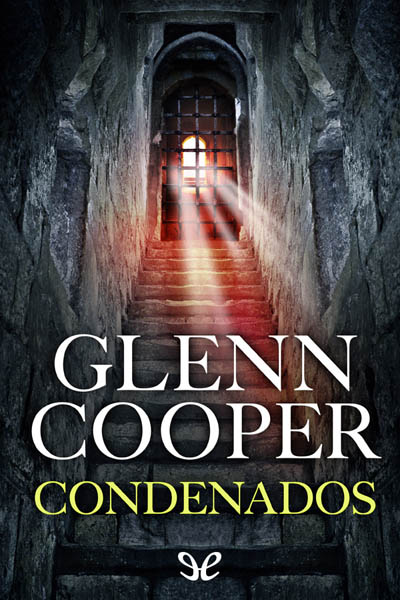
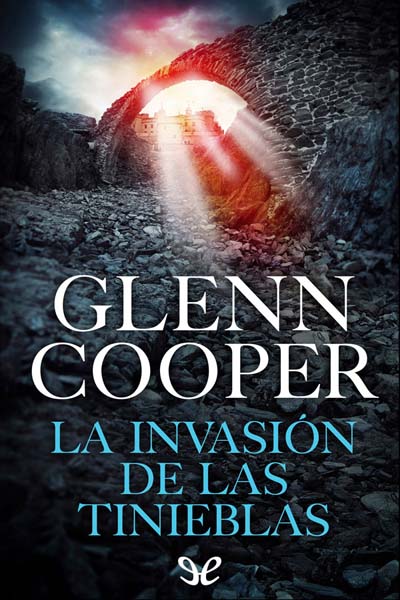
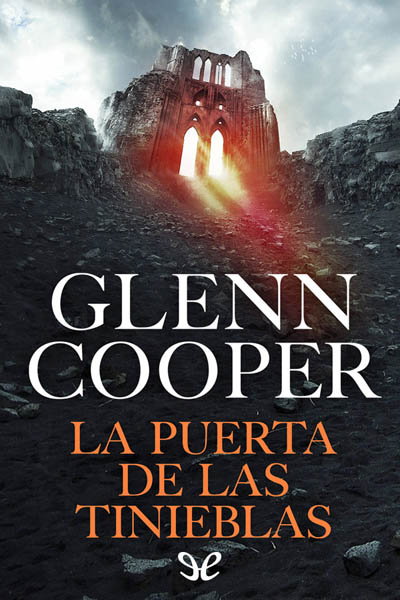
![descargar libro La señal de la cruz [ed.: Primera edición]](/imglibro/glenn-cooper-la-seal-de-la-cruz-ed-primera-edicin.jpg)
